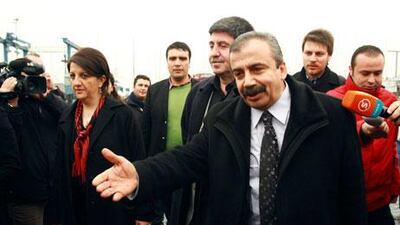ISTANBUL // Peace talks between Turkey and Abdullah Ocalan, the jailed Kurdish rebel leader, are gaining momentum with Ocalan expected to call a ceasefire on March 21, the day of the Kurdish spring festival of Newroz, analysts and politicians said today.
A ceasefire on Newroz would be symbolic for both Kurds and Turks, because the festival in the past has been marred by violent clashes between Kurdish activists and Turkish security forces.
Mehmet Yegin, an expert on Ocalan's Kurdistan Workers' Party (PKK) at the International Strategic Research Organisation, a think tank in Ankara, confirmed that he was expecting the call.
"I see a determination on both sides," he said.
Selahattin Demirtas, the leader of the Party for Peace and Democracy (BDP), Turkey's biggest Kurdish party, said his group had received a letter from Ocalan, spelling out the rebel leader's plans for peace, days after a BDP delegation visited Ocalan in prison on Saturday.
Mr Demirtas did not give details of the letter. But he told the Kurdish Ozgur Gundem newspaper that Ocalan, 64, wanted to complete work on a comprehensive peace plan within two to three weeks. That plan is said to include a ceasefire and a retreat of PKK fighters from Turkey by early summer, in effect ending an almost 30-year insurgence.
Ocalan wants to use the negotiations to get concessions from the Turkish state, including legal guarantees protecting the Kurds' rights and strengthening local self-rule, in exchange for an end to the fighting.
The NTV news channel, quoting from Ocalan's letter today, reported that the plan included three stages, starting with a ceasefire and withdrawal of PKK fighters from Turkey to rebel bases in northern Iraq. Legal and political reforms aimed at improving the rights of Turkey's estimated 12 million Kurds should follow, the report said. In a final stage, the PKK fighting force would be dissolved, with most rebels returning to their families in Turkey.
"We are hoping for positive developments by Newroz," Mr Demirtassaid. The PKK might release Turkish prisoners even before that. In the meeting with the BDP delegation, Ocalan said he hoped prisoners held by the PKK would be released soon.
"We are living through a historical period," Ocalan was quoted as saying by the Kurdish delegation.
Besir Atalay, a deputy prime minister, said today the government was working on a national legal reform package that would widen the limits of free speech, opening the way for the release of several hundred Kurdish activists currently in pretrial detention on charges of support for the PKK.
The prime minister, Recep Tayyip Erdogan, who ordered Turkish intelligence officials to start negotiations with Ocalan last December, yesterday underlined his determination to find a peaceful end to a conflict that has killed more than 40,000 people since the PKK took up arms to fight for Kurdish self-rule in 1984.
"We will explore every alley to find a solution," Mr Erdogan said in Ankara. But he acknowledged that many challenges lay ahead.
"War is easy, but peace is difficult," he said. "We are even ready to drink the cup of hemlock."
Mr Erdogan's decision to start peace talks with Ocalan has been harshly criticised by Turkish nationalists, who accuse the prime minister of selling out to Kurdish separatists in the hope of winning the presidency in 2015.
A breakthrough to end the Kurdish conflict could be a trump card for Mr Erdogan in upcoming elections, polls suggest.
Answering the nationalists' criticism, Mr Erdogan said ethnic groups such as the Kurds should live freely in a single state.
"A Kurd is my brother as much as a Turk is my brother," he said.
The Turkish intelligence service started talks with Ocalan on the island of Imrali, where he has been held since Turkish agents captured him in Kenya in 1999. Despite being locked away for 14 years, Ocalan's authority to speak on behalf of the Kurds has endured. Last November, hundreds of Kurdish political prisoners ended a hunger strike after he ordered them to do so.

